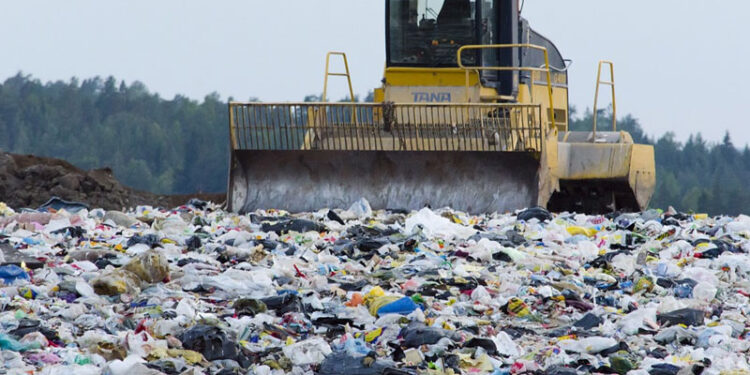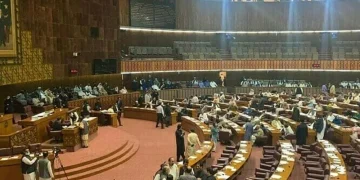Saudi Arabia wants to recycle 95% of its waste by 2040. The Kingdom announced this ambitious plan in early 2024 as part of its goal to build a circular economy under Vision 2030.
The numbers show the scale of this challenge. Saudi Arabia produces over 110 million tons of waste each year. More than half comes from three major cities: Riyadh generates 21%, Jeddah produces 14%, and Dammam creates 8% of the total waste.
The Kingdom’s waste management market will grow from $5.97 billion in 2025 to $8.72 billion by 2030. This massive effort could add SR120 billion ($32 billion) to the country’s GDP by 2040.
Saudi Companies Drive Waste Innovation Forward
The Saudi Investment Recycling Company (SIRC) leads this transformation. As the largest waste management company in the GCC, SIRC aims to divert 82% of all waste from landfills by 2035.
SIRC processed 600,000 tons of industrial waste in 2022. The company handles 14 types of waste, from everyday garbage to medical waste and construction debris. It uses recycling, reusing, treatment, and waste-to-energy conversion methods.
“We have Vision 2030 – we know where we’re going. We have the right investment and the right regulation,” said Ziyad Al-Shiha, Group CEO of SIRC.
SIRC recently launched its first solid waste treatment plant inside Jeddah Islamic Port. The company also established ELECTA in 2022 to focus on electronic waste management.
Universities and Research Centers Join the Effort
Academic institutions play a important role in developing waste management solutions. Sultan Al-Muaythir, chairman of the civil engineering department at Prince Sattam bin Abdulaziz University, explains how multiple disciplines contribute to this sector.
Civil engineering helps design landfills and waste management infrastructure. Mechanical engineering advances collection and treatment equipment. Chemical, agricultural, and biotechnology engineering analyze waste composition and develop transformation processes. Electrical engineering operates smart systems and manages energy from waste treatment.
The Saudi Scientific Research and Innovation Association supports this ecosystem with business incubators and innovation accelerators. The association provides technical and financial assistance to researchers and connects them with investors.
Abdullah Alakel, chairman of the association, says they run joint initiatives with academic and industrial partners. These projects convert organic waste into fertilizers and biofuels. Other projects develop scalable recycling technologies.
Technology and AI Transform Waste Processing
Artificial intelligence improves waste sorting and collection processes. This technology boosts operational efficiency and reduces environmental harm. The Kingdom plans to process 100 million tonnes of waste annually with support from more than 65 facilities.
Smart systems track waste collection vehicles online and manage waste bin operations. Companies invest in expanding their collection and treatment networks across the country.
NEOM, Saudi Arabia’s futuristic city project, incorporates circular economy principles from the ground up. The $500 billion smart city plans to implement circular economic models where all waste becomes valuable resources.
New Regulations Support Private Investment
Saudi Arabia published a new Waste Management Law in 2021. This law regulates transport, segregation, storage, import, export, and safe disposal of waste. All parties must recycle, retrieve resources, and ensure safe disposal.
The National Center for Waste Management (MWAN) issues licenses to all service providers and facilities. The center grants permits to recycling facilities after they meet necessary requirements.
Farah Al-Gharib, CEO of Precision & Choice Environmental Solutions, calls for more integrated systems that encourage public-private partnerships. She wants source-level sorting activation and financial incentives for investors.
“Based on our experience in the sector, we believe that unifying and updating regulations under a single, clear, and transparent regulatory framework would directly contribute to attracting investors,” Al-Gharib said.
International Partnerships Accelerate Progress
Global companies partner with Saudi firms to share expertise. Veolia signed a memorandum of understanding with SIRC in December 2024 to develop waste management solutions. SUEZ joined forces with SIRC to foster circular economy projects and develop waste-to-energy infrastructure.
The Alliance to End Plastic Waste collaborates with SIRC to explore effective waste management solutions, particularly targeting municipal solid waste challenges.
These partnerships bring global best practices to Saudi Arabia while adapting solutions to local conditions.
Ambitious Targets Drive Economic Growth
By 2040, Saudi Arabia plans to divert 90% of all waste streams from landfills. The breakdown includes:
- 40% recycling
- 31% composting
- 16% waste-to-energy conversion
- 3% other methods
The Kingdom currently landfills most waste at an average cost of $1.87 per ton. Environmental degradation from solid waste costs the country $1.3 billion annually.
Food waste alone costs Saudi Arabia $10.6 billion each year, with food loss and waste reaching 33%. The government now mandates restaurants and wedding halls to contract with food banks to preserve excess food.
Major Cities Lead Implementation
Riyadh plans to divert 94% of waste from landfills and compost over 1.3 million tons of biodegradable waste. This will significantly reduce greenhouse gas emissions from the capital.
Jeddah works with the Waste Collection and Recycling Co. (WASCO) through exclusive agreements. WASCO operates centers for managing recyclable municipal waste in Jeddah and its suburbs.
The Eastern Province coordinates with municipalities to implement waste management strategies and generate procurement opportunities for private companies.
Vision 2030 Creates Long-term Value
Saudi Arabia’s approach combines innovation, regulation, and investment to create a sustainable waste management system. The Kingdom transforms waste from an environmental burden into an economic opportunity.
This transformation supports Vision 2030’s goals of building a vibrant society and diversified economy. The waste management sector creates jobs, attracts investment, and reduces environmental impact.
Individual responsibility also plays a role. Citizens must adopt conscious behaviors toward waste sorting and recycling to build a sustainable future.
The Kingdom’s comprehensive approach positions it to become a regional leader in circular economy practices. Success depends on continued coordination between government, private sector, and research institutions.













